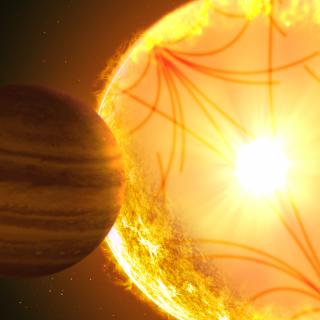Bibcode
Pagano, I.; Scandariato, G.; Singh, V.; Lendl, M.; Queloz, D.; Simon, A. E.; Sousa, S. G.; Brandeker, A.; Cameron, A. Collier; Sulis, S.; Van Grootel, V.; Wilson, T. G.; Alibert, Y.; Alonso, R.; Anglada, G.; Bárczy, T.; Navascues, D. Barrado; Barros, S. C. C.; Baumjohann, W.; Beck, M.; Beck, T.; Benz, W.; Billot, N.; Bonfils, X.; Borsato, L.; Broeg, C.; Bruno, G.; Carone, L.; Charnoz, S.; Corral van Damme, C.; Csizmadia, Sz.; Cubillos, P. E.; Davies, M. B.; Deleuil, M.; Deline, A.; Delrez, L.; Demangeon, O. D. S.; Demory, B. -O.; Ehrenreich, D.; Erikson, A.; Fortier, A.; Fossati, L.; Fridlund, M.; Gandolfi, D.; Gillon, M.; Güdel, M.; Günther, M. N.; Helling, Ch.; Hoyer, S.; Isaak, K. G.; Kiss, L. L.; Kopp, E.; Lam, K. W. F.; Laskar, J.; Lecavelier des Etangs, A.; Magrin, D.; Maxted, P. F. L.; Mordasini, C.; Munari, M.; Nascimbeni, V.; Olofsson, G.; Ottensamer, R.; Pallé, E.; Peter, G.; Piotto, G.; Pollacco, D.; Ragazzoni, R.; Rando, N.; Rauer, H.; Reimers, C.; Ribas, I.; Rieder, M.; Santos, N. C.; Ségransan, D.; Smith, A. M. S.; Stalport, M.; Steller, M.; Szabó, Gy. M.; Thomas, N.; Udry, S.; Venturini, J.; Walton, N. A.
Referencia bibliográfica
Astronomy and Astrophysics
Fecha de publicación:
2
2024
Revista
Número de citas
10
Número de citas referidas
10
Descripción
Context. Multiwavelength photometry of the secondary eclipses of extrasolar planets is able to disentangle the reflected and thermally emitted light radiated from the planetary dayside. Based on this, we can measure the planetary geometric albedo Ag, which is an indicator of the presence of clouds in the atmosphere, and the recirculation efficiency ϵ, which quantifies the energy transport within the atmosphere.
Aims: We measure Ag and ϵ for the planet WASP-178 b, a highly irradiated giant planet with an estimated equilibrium temperature of 2450 K.
Methods: We analyzed archival spectra and the light curves collected by CHEOPS and TESS to characterize the host WASP-178, refine the ephemeris of the system, and measure the eclipse depth in the passbands of the two telescopes.
Results: We measured a marginally significant eclipse depth of 70 ± 40 ppm in the TESS passband, and a statistically significant depth of 70 ± 20 ppm in the CHEOPS passband.
Conclusions: Combining the eclipse-depth measurement in the CHEOPS (λeff = 6300 Å) and TESS (λeff = 8000 Å) passbands, we constrained the dayside brightness temperature of WASP-178 b in the 2250-2800 K interval. The geometric albedo 0.1< Ag<0.35 generally supports the picture that giant planets are poorly reflective, while the recirculation efficiency ϵ >0.7 makes WASP-178 b an interesting laboratory for testing the current heat-recirculation models.
Aims: We measure Ag and ϵ for the planet WASP-178 b, a highly irradiated giant planet with an estimated equilibrium temperature of 2450 K.
Methods: We analyzed archival spectra and the light curves collected by CHEOPS and TESS to characterize the host WASP-178, refine the ephemeris of the system, and measure the eclipse depth in the passbands of the two telescopes.
Results: We measured a marginally significant eclipse depth of 70 ± 40 ppm in the TESS passband, and a statistically significant depth of 70 ± 20 ppm in the CHEOPS passband.
Conclusions: Combining the eclipse-depth measurement in the CHEOPS (λeff = 6300 Å) and TESS (λeff = 8000 Å) passbands, we constrained the dayside brightness temperature of WASP-178 b in the 2250-2800 K interval. The geometric albedo 0.1< Ag<0.35 generally supports the picture that giant planets are poorly reflective, while the recirculation efficiency ϵ >0.7 makes WASP-178 b an interesting laboratory for testing the current heat-recirculation models.
The CHEOPS photometric data used in this work are available at the CDS cdsarc.cds.unistra.fr or via https://cdsarc.cds.unistra.fr/viz-bin/cat/J/A+A/682/A102
The CHEOPS program ID is CH_PR100016.
Proyectos relacionados

Sismología Solar y Estelar y Búsqueda de Exoplanetas
Los objetivos genéricos de este Proyecto son: 1) el estudio de la estructura y dinámica del interior solar, 2) la extensión de dicho estudio al caso de otras estrellas, 3) la búsqueda y caracterización de planetas extrasolares por métodos fotométricos (principalmente mediante el método de tránsitos) y espectroscópico (variaciones en la velocidad
Savita
Mathur

Exoplanetas y Astrobiología
La búsqueda de vida en el Universo se ha visto impulsada por los recientes descubrimientos de planetas alrededor de otras estrellas (los llamados exoplanetas), convirtiéndose en uno de los campos más activos dentro de la Astrofísica moderna. En los últimos años los descubrimientos cada vez más numerosos de nuevos exoplanetas y los últimos avances
Enric
Pallé Bago